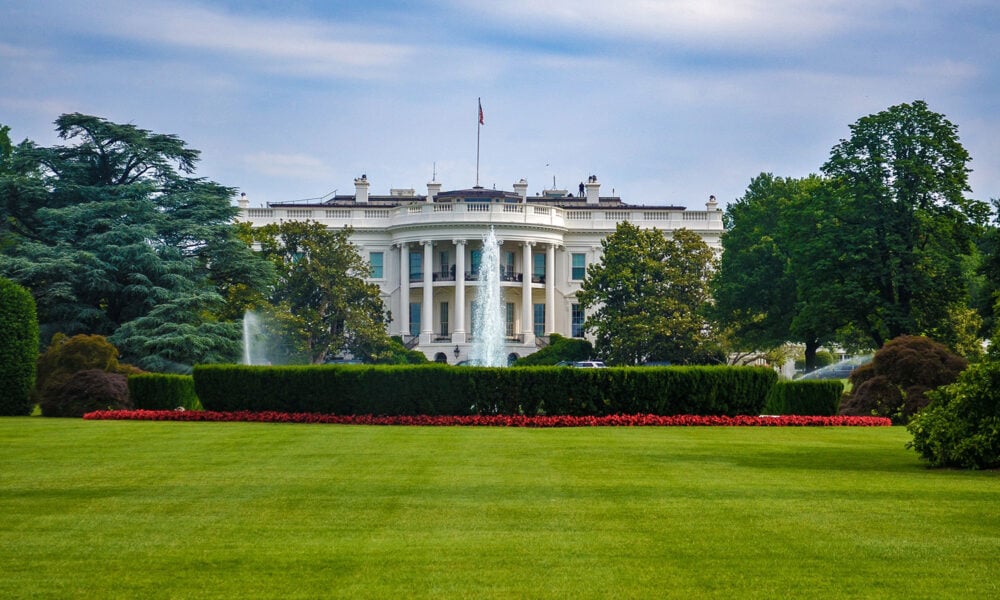The Biden administration has been a little busy since taking office, what with an ongoing pandemic, the continuing prevalence of race-related and gun violence, and attacks on voting rights, just to name a few urgent problems. So the administration could be forgiven for allowing to slip down its priority list a significant issue that may sound to many like old news—nuclear weapons.
It is not surprising that one result of Biden’s history of competence and cool-headedness on nuclear weapons issues is a sense of relief among many watching. The danger is that this may come with a tendency toward a wait-and-see approach that gives the administration the benefit of the doubt until some of the more immediate fires can be put out.
This, however, would be a mistake. Nuclear weapons are not a problem that can be ignored, even when we are confident that those in charge of them can be trusted to act responsibly. And the US still has close to 5,000 of these weapons in its arsenal, with plans to spend more than a trillion dollars on rebuilding essentially all of them. They are a clear and present danger to all human life for as long as they exist. Measures to reduce the risks posed by nuclear weapons and redoubling our efforts to eliminate them entirely offer clear benefits to US security, particularly when international relations are tense and uncertain.
President Biden has a long history of caring about this issue, and during his campaign promised to address it. If the Biden administration wants to make progress on this issue—and it is vital that it does so—there is no time to waste to take bold action.
Doubling down on disarmament
This week—April 5—marks the anniversary of President Obama’s 2009 speech in Prague when he declared “America’s commitment to seek the peace and security of a world without nuclear weapons.” Obama’s boldness in committing to this goal helped to earn him a Nobel Peace Prize but, unfortunately, this strong rhetorical start did not lead to significant reductions in the US nuclear arsenal or visionary changes in policy. Instead, Obama’s administration was bogged down by both internal and external opposition. It ultimately failed to overcome the entrenched interests in government, the military, and the defense industry that cling to the status quo, regardless of its danger or obsolescence.
These voices and powerful interests have not disappeared. And in the meantime US relations with both Russia and China have deteriorated. The previous administration’s decision to withdraw from the Iran nuclear deal also led to increased uncertainty on that front. The world today is more unsettled and less optimistic than it was when the Obama administration took office. Far from necessitating a pullback from Obama’s bold goal, however, the current situation only underscores the urgent need for strong US leadership on nuclear disarmament. A renewed commitment from the Biden administration, backed up by substantive action, could get things back on track and go a long way to reducing the danger nuclear weapons present to the United States and the rest of the world.
Controlling nuclear weapons serves US interests
The idea that the United States should shy away from treaties and agreements because of the potential for cheating on the part of its negotiating partners completely misunderstands the point of these accords in the first place.
Nuclear arms control and arms reduction agreements benefit US security, especially when relationships with its adversaries are difficult. This was well-known among both political and military leaders during the height of the Cold War. The United States and Soviet Union began negotiating ways to limit and eventually reduce nuclear testing, types of weapons, and their numbers almost from the moment the Soviet Union joined the US as a nuclear power. This was done not in an attempt to improve relations between the two countries, but in recognition that the best way to improve US security was to reach agreements that provided clear limits on weapons and increased transparency. They also established mechanisms for settling disputes when they arose. These are not the types of deals you make with your friends, and historically this was recognized by both US political parties. The Senate ratified the 1963 Limited Test Ban Treaty by a vote of 80 to 19; the 1972 Anti-Ballistic Missile treaty by a vote of 88 to 2; and the 1987 INF Treaty by a vote of 93 to 5.
The Biden administration did the right thing by quickly reaching a deal with Russia to extend the New START treaty, the only remaining treaty limiting US and Russia nuclear arsenals. Without the extension, the treaty would otherwise have expired soon after Biden took office. Now it is time to build on this opportunity.
Next steps on nuclear arms control
The United States and Russia must build on the New START treaty extension in a new round of arms control negotiations. Both sides should be ambitious in their approach, and willing to discuss some of the issues that have been stumbling blocks in the past, such as limiting missile defense and tactical nuclear weapons, as well as taking on new technologies like space and cyber weapons.
The Biden administration should also continue its efforts to rejoin the Iran nuclear deal, which places limits on Iran’s nuclear program, as soon as possible.
While progress on some of this agenda will require reaching agreement with Russia or other states, there is also much that the Biden administration can do on its own, including, as a first step, undertaking a fundamental reassessment of the role of nuclear weapons, strategic missile defense, and the interaction between them, in US security.
There are further steps that the Biden administration can take right now to reform US nuclear policy to reduce its reliance on nuclear weapons. These should include declaring that the United States will never be the first to use nuclear weapons and scaling back expensive and unnecessary plans to rebuild the entire US nuclear arsenal.
The Nuclear Ban Treaty: a missed opportunity for the United States
To signal its commitment to taking nuclear disarmament seriously, the Biden administration should also rethink the US approach to the Treaty on the Prohibition of Nuclear Weapons (TPNW, often called the Nuclear Ban Treaty) and encourage other nuclear weapons states to do so as well. This historic treaty—the first to make illegal the possession, use, and threat of use of nuclear weapons—entered into force on January 22, 2021, following ratification by more than the required 50 states. The United States, along with the other nuclear weapons states, has not signed or ratified the treaty.
The US attitude toward the Ban Treaty has been unproductive since the beginning. Nuclear disarmament would benefit the United States, with its enormous conventional military, perhaps more than any other state. But instead of welcoming the Ban Treaty as a new opportunity to make progress toward its nuclear disarmament obligations under the 1967 Nuclear Nonproliferation Treaty, progress that has long been stalled, the United States refused to participate in the treaty’s negotiations. This refusal to even be at the table meant giving up any chance it had of influencing the outcome in accord with its own interests.
Article VI of the NPT requires that all state parties—including the United States and the other four recognized nuclear weapons states—“pursue negotiations in good faith on effective measures relating to cessation of the nuclear arms race at an early date and to nuclear disarmament.” This requirement has long been a source of tension among parties to the treaty, with the non-nuclear weapons states accusing the nuclear weapons states of failing to take any real action toward fulfilling their disarmament obligations and instead simply using the treaty to perpetuate nuclear inequality between the nuclear haves and have-nots. Many of the non-nuclear weapons states see the Ban Treaty as complementary to the NPT, and a way to satisfy the NPT’s requirement for negotiating nuclear disarmament. While some US officials argue that the Ban treaty undermines the NPT, in fact, participation in the Ban Treaty may be the best way to ensure its continued relevance.
Moving to a new definition of security
The Biden administration has a chance to reconceive US security policy in a transformative way. A true commitment to a new kind of security would move the United States away from relying on dangerous nuclear arsenals and policies and out-of-control military spending.
The outdated US reliance on defining national security in purely military terms has left the country struggling to grapple with immediate threats such as COVID-19. There are sure to be more such challenges to come. The United States should shift perspective and move to defining security based more on human wellbeing and international cooperation to fight common threats such as pandemics and the effects of climate change while reducing the emphasis on military force. This would free up trillions of dollars the US plans to spend on updating existing nuclear weapons and procuring new ones to invest in truly making the US safer and more prosperous.
The featured image in this blog is courtesy of David Everett Strickler/unpslash

